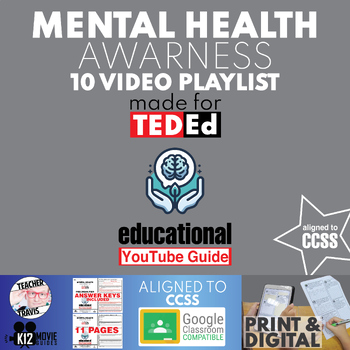TedEd Intro to Mental Health Awareness | Depression, Bipolar, PTSD, Panic Attack
- Zip
- Google Apps™

Also included in
- This TED-Ed YouTube Video Guide Bundle includes 25 video guides and is great to have in your emergency toolkit for substitutes, social studies, science or after testing days. Simply print, press play and watch students engage, discuss and learn.Check the preview files for each individual product toPrice $12.89Original Price $19.88Save $6.99
Description
This TedEd Intro to Mental Health Awareness | Depression, Bipolar, PTSD, Panic Attack challenges students to distinguish sadness from clinical depression and exploring signs and treatments, to demystifying bipolar disorder, narcissism, schizophrenia, OCD, PTSD, panic attacks, the value of self-talk, and the reality of imposter syndrome. Each episode invites students to explore different aspects of mental health, understand the complexities of various conditions, and learn about effective treatments. See the list of episodes included below as well as a short description of what each covers.
On the Fence? Try the first episode's guide in this playlist before you buy it!
Free | TedEd Intro to Mental Health Awareness | What is depression? Youtube Video Guide
Click the link below to view the playlist that this YouTube Guide covers.
TedEd Mental Health Awareness Playlist
Note: This resources covers the most popular 10 episodes in the 17 episode playlist compiled by TedEd.
#1 - What is depression? - Helen M. Farrell
- Understand the difference between feeling temporarily sad and having clinical depression.
- Learn about the symptoms and challenges of diagnosing depression.
- Explore various treatments and their importance in managing depression.
#2 - What is Bipolar Disorder? - Helen M. Farrell
- Discover the types of bipolar disorder and their distinct symptoms.
- Examine the causes, including genetics and environmental factors.
- Analyze treatment options and the role of support in managing bipolar disorder.
#3 - The Psychology of Narcissism - W. Keith Campbell
- Uncover the origins and forms of narcissism through the Narcissus myth.
- Differentiate between grandiose and vulnerable narcissism.
- Investigate the impact of narcissism on personal relationships and social media.
#4 - What is Schizophrenia? - Anees Bahji
- Clarify common misconceptions about schizophrenia.
- Delve into the symptoms, causes, and risk factors of schizophrenia.
- Discuss the effectiveness of medications and the significance of early intervention.
#5 - Debunking the Myths of OCD - Natascha M. Santos
- Address misconceptions and clarify what Obsessive Compulsive Disorder truly involves.
- Explore the causes and a range of treatments for OCD.
- Highlight the role of research in understanding OCD and developing future treatments.
#6 - The Psychology of Post-Traumatic Stress Disorder - Joelle Rabow Maletis
- Explain PTSD as a response to trauma, not a personal failing.
- Discuss genetic and environmental factors that increase PTSD risk.
- Review the treatments available and the importance of empathy in recovery.
#7 - What Causes Panic Attacks, and How Can You Prevent Them? - Cindy J. Aaronson
- Describe the physiological process behind panic attacks.
- Identify triggers and discuss diagnosis and treatment of panic disorder.
- Emphasize understanding panic attacks for prevention and stress management.
#8 - Is It Normal to Talk to Yourself?
- Recognize self-talk as a common and healthy behavior.
- Discuss the challenges in studying self-talk and its impact on attitude and performance.
- Explore distanced self-talk and the effects of negative self-talk on mental health.
#9 - How Do Antidepressants Work? - Neil R. Jeyasingam
- Trace the discovery of antidepressants and the development of the chemical imbalance theory.
- Examine the evolution of antidepressant drugs and the impact of SSRIs.
- Reevaluate the chemical imbalance theory and discuss current treatment approaches.
#10 - What is Imposter Syndrome and How Can You Combat It? - Elizabeth Cox
- Learn about the experiences of notable figures with imposter syndrome.
- Understand the demographics affected by imposter syndrome and its characteristics.
- Explore strategies to combat imposter syndrome and build confidence.
★You're In Good Hands★
Although this YouTube guide doesn't have many ratings yet, please don't be overly concerned as it was posted more recently than my other resources. Please visit MY STORE to see over 6,000 ratings with a average ★★★★ average.
This product includes:
- An Answer Key with CCSS Alignment (PDF - 11 Pages)
- A Student Movie Guide (PDF - 11 Pages)
- A PDF with link to a Google Slides version (72 Slides)
- Admin Movie Request, CCSS alignment for entire playlist, Permission Slip (2 Pages)
- A free resources and 'About' section (8 Pages - Not included in the page count for this product)
- CCSS Note: I’ve taken the liberty of aligning certain reading standards with the act of consuming content via the movie instead. Although students aren’t reading they are asked to perform the same cognitive functions on the content that they consumed from the movie.
Get Free TPT Credits!
- Leave Feedback for this product and earn TPT credits
- 20 Credits = $1 OFF any TPT purchase
General Tips for Using this YouTube Guide:
- Print one, double-sided YouTube guide for each student
- Preview the next question on the YouTube guide as you complete each one, this can help students pay attention to important upcoming events.
- Pause at the times designated on the YouTube guide, encourage students to debate, discuss and talk about their ideas before writing their answers.
- Discourage students from simply copying answers.
- Randomly choose a student to share their answer and defend it if necessary.
- If time allows, feel free to rewind and show important parts of the clip again for additional analysis.
- On average, this YouTube guide will require about 15~20 minutes per episode
FREE Movie Guides & Resources:
Get a feel for my work and see if this resource is right for you. I ask questions that require students to 'live' on the higher levels of Bloom's taxonomy.
- Free Kung Fu Panda 3 Movie Guide (PG - 2016)
- Free The Lightning Thief Movie Guide (PG - 2010)
- Free Home Alone 2 Movie Guide (PG - 1992)
- Free! Story Elements Worksheet
- Free! Character Analysis & Comparison
Your feedback, ratings, likes and follows are appreciated:
- TpT Store - TeacherTravis
- Pinterest - TeacherTravis
- Instagram - Teachers Travis
- Facebook - K12MovieGuides
- Twitter - K12MovieGuides
- Blog & Website - K12MovieGuides
See my movie guides below, by category, or search for one at my TPT STORE
- All Movie Guides (300+)
- Elementary Movie Guides
- Middle/Jr. High School Movie Guides
- High School Movie Guides
- G-Rated Movie Guides
- Documentary Movie Guides
- Holiday-Themed Movie Guides
- Bundled Movie Guides
- Liberty's Kids Series
- Mankind the Story of All of Us Series (HistoryChannel)
- Our Planet Netflix Series
DISCLAIMER: This educational supplement is independently crafted to accompany discussions on various TED-Ed videos and is intended solely for educational use. It aims to provide a structured framework for analyzing and understanding the content presented in these videos, focusing on themes, key concepts, and critical thinking questions. This resource does not contain copyrighted material from TED-Ed or any specific video content, nor does it replace watching the TED-Ed videos themselves, which should be accessed through legal and official channels. This supplement is not affiliated with, authorized, sponsored, or endorsed by TED, TED-Ed, or any entities associated with the creation or distribution of TED-Ed videos. TED-Ed and its videos are the property of their respective copyright holders. This guide is designed to act as an auxiliary educational tool to enhance learning and discussion.
Keywords: Mental Health Awareness | Clinical Depression | Symptoms of Depression | Diagnosing Challenges | Treatment Options | Medication | Therapy | Electroconvulsive Therapy | Transcranial Magnetic Stimulation | Mental vs. Physical Health | Community Support | Empathy | Research Importance | Educational Discussion | Psychology | Health Education | Classroom Resource | Student Engagement | Critical Thinking | Emotional Well-being | Healing Process | Depression Awareness | Coping Strategies | Mental Health Education






